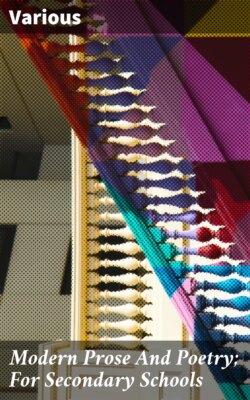Читать книгу Modern Prose And Poetry; For Secondary Schools - Various - Страница 7
На сайте Литреса книга снята с продажи.
NOTES
ОглавлениеTable of Contents
Harlem River:—Note that this river is in New York City, not in France as one might suppose from the name of the selection.
Devonshire:—A very attractive county of southwestern England.
filet:—A thick slice of meat or fish.
charmant:—The French word for charming.
Roquefort:—A kind of cheese.
Sacré! Vous êtes le diable:—Curses! You are the very deuce.
passe-partouts:—Engraved ornamental borders for pictures.
gendarme:—A policeman of France.
Napoleon III:—Emperor of the French, 1852–1870. He was elected president of the Republic in 1848; he seized full power in 1851; in 1852, he was proclaimed emperor. He was a nephew of the great Napoleon.
confrère:—A close associate.
Garibaldi:—Giuseppe Garibaldi, an Italian patriot (1807–1882).
Chianti:—A kind of Italian wine.
Bronx:—A small river in the northern part of New York City.
Restaurant Français:—French restaurant.
the painter:—A rope at the bow of a boat.
C'est merveilleux:—It's wonderful.
Mon Dieu:—Good heavens!
pâté de fois gras:—A delicacy made of fat goose livers.
Château Lamonte, '62:—A kind of wine; the date refers to the year in which it was bottled.
Oui, mon père:—Yes, father.
mon ami:—My friend.
the little affair of December 2:—On December 2, 1851, Louis Napoleon overawed the French legislature and assumed absolute power. Just a year later he had himself proclaimed Emperor.
Louis:—Napoleon III.
Victor Hugo:—French poet and novelist (1802–1885).
Louis Blanc:—French author and politician (1812–1882).
Changarnier:—Pronounced shan gär nyā'; Nicholas Changarnier, a French general (1793–1877).
Cavaignac:—Pronounced ka vay nyak'; Louis Eugene Cavaignac, a French general (1803–1857). He ran for the Presidency against Louis Napoleon.
Porte St. Martin:—The beginning of the Boulevard St. Martin, in Paris.
Rue Royale:—Rue is the French word for street.
Élysée:—A palace in Paris used as a residence by Napoleon III.
one hundred francs:—About twenty dollars.
